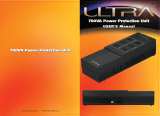
Table of Contents/Índice/Table des matières
SDU Series Instruction Manual • iii
English
1.0 Important Safety Instructions .......................................................................................................... 4–5
2.0 Warnings Dened ............................................................................................................................... 5
3.0 Introduction ......................................................................................................................................... 6
4.0 System Description ......................................................................................................................... 7–8
5.0 Installation Instructions ....................................................................................................................... 9
6.0 Operating Instructions .................................................................................................................. 9–10
7.0 Battery Overload Alarms ................................................................................................................... 10
8.0 PIN-Out Conguration for DB9 Connector ....................................................................................... 11
9.0 Battery Backup Times ....................................................................................................................... 11
10.0 Troubleshooting .............................................................................................................................. 12
11.0 Storage ........................................................................................................................................... 12
12.0 Specications ................................................................................................................................. 13
13.0 Conditions for Safe Use of SDU 500 & 850 .............................................................................. 14–15
14.0 Product Registration & Warranty Information ................................................................................. 15
Español
1.0 Instrucciones importantes de seguridad ..................................................................................... 16–17
2.0 Denición de advertencias ............................................................................................................... 17
3.0 Introducción ...................................................................................................................................... 18
4.0 Descripción de sistema ...............................................................................................................19–20
5.0 Instrucciones de instalación ............................................................................................................. 21
6.0 Instrucciones de operación ......................................................................................................... 21–22
7.0 Tiempo de autonomía de la batería (Alarma) ................................................................................... 23
8.0 Conguración de disposición de las clavijas del conector DB9 ........................................................ 23
9.0 Tiempo de reserva de la batería ....................................................................................................... 24
10.0 Almacenamiento ............................................................................................................................. 24
11.0 Solución de problemas ................................................................................................................... 25
12.0 Especicaciones ............................................................................................................................. 26
13.0 Registro del Producto y Información sobre la Garantía .................................................................. 27
Français
1.0 Instructions importantes sur la sécurité ...................................................................................... 28–29
2.0 Dénition des avertissements ........................................................................................................... 29
3.0 Introduction ....................................................................................................................................... 30
4.0 Description du système .............................................................................................................. 31–32
5.0 Instructions d’installation .................................................................................................................. 33
6.0 Instructions d’utilisation .............................................................................................................. 33–34
7.0 Alarmes de la batterie de secours .................................................................................................... 35
8.0 Conguration des broches de sortie du connecteur DB9 ................................................................. 35
9.0 Temps de secours de batterie .......................................................................................................... 36
10.0 Entreposage ................................................................................................................................... 36
11.0 Dépannage ..................................................................................................................................... 37
12.0 Spécications ................................................................................................................................. 38
13.0 Enregistrement du produit et information sur la garantie ................................................................ 39
















